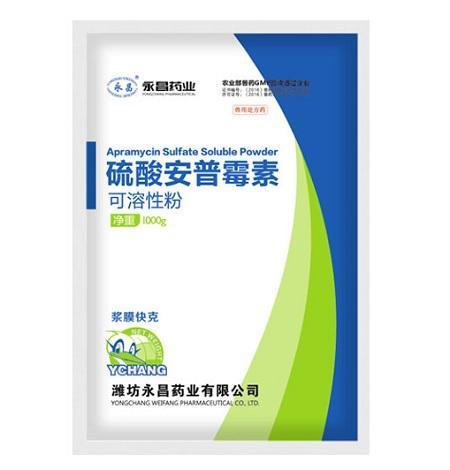Apramycin sulfate, also known as Apramycin sulphate, is a latest-generation aminoglycoside antibiotic specifically developed for animals. It is a new veterinary antibiotic produced by a bacterium called Streptomyces tenebrarius and was first developed in the 1980s in the United States. Today, large-scale production of Apramycin sulfate is highly mature and it is mainly obtained through biotechnological fermentation processes, making it a biopharmaceutical within the field of biotechnology. It is safe for oral administration in animals, and due to its limited intestinal absorption, the withdrawal period for poultry is only 7 days.

Through determination of its bioavailability in poultry, it has been found that healthy poultry have an oral absorption rate of no more than 10%. However, when poultry is in a pathological state, with thinning of the intestines or pathological damage to the intestinal mucosa, the amount of Apramycin sulfate absorbed by the body increases slightly, but even so, it does not exceed 20% of the oral dose.
This product is a bactericidal agent that exhibits highly effective antibacterial activity by interfering with bacterial protein synthesis. It has a broad spectrum of antibacterial activity, particularly against pathogenic bacteria such as multidrug-resistant Escherichia coli, Proteus, Spirochaetes, some Streptococcus, and Salmonella. Therefore, it is listed by the US FDA as the first-choice drug for the treatment of colibacillosis in animals.
Its characteristics include a broad antibacterial spectrum and low likelihood of developing resistance. It has outstanding therapeutic effects against infections caused by Escherichia coli, Salmonella, and Chlamydia in chickens. Therefore, it is primarily used in clinical veterinary medicine for the treatment of colibacillosis, salmonellosis, Proteus infection, and chlamydial infection in poultry, with definite efficacy. It is the preferred drug for treating colibacillosis in the chicken digestive tract.
Apramycin sulfate can be administered through drinking water, injection, or mixed feeding in practical use.
When treating colibacillosis and salmonellosis in poultry, the dosage for oral administration through drinking water is 250-500mg of Apramycin sulfate per liter of water, administered continuously for 3-5 days, and stopped 7 days before marketing or slaughter. Since the bioavailability of oral administration through drinking water is less than 10%, it is often used in combination with drugs such as penicillin, cephalosporin, quinolone, and amphenicol that have synergistic effects on the treatment of acute colibacillosis, ensuring the therapeutic effect on systemic infections.
Apramycin sulfate is more suitable for the treatment of intestinal bacterial infectious diseases when administered alone through drinking water. If Apramycin sulfate is used alone for the treatment of systemic acute infectious diseases, injection therapy is preferred. When using Apramycin sulfate, it can be administered by intramuscular injection at a dose of 10mg/kg body weight. It exhibits strong antibacterial activity against antibiotic-resistant Escherichia coli and Salmonella, and is less likely to develop resistance.
In the winter and spring seasons, colibacillosis, salmonellosis, and respiratory diseases in poultry are more frequent and severe compared to other seasons. When veterinarians prescribe medications after diagnosing these diseases, using Apramycin sulfate as a "primer" in technical combination therapy can achieve unique therapeutic effects. Apramycin sulfate has a wide range of compatibility. For example, when used at half the treatment dose in combination with florfenicol, it significantly enhances the therapeutic effect of florfenicol on respiratory Escherichia coli. When used at half the treatment dose in combination with tilmicosin, it improves the therapeutic effect of tilmicosin on respiratory pneumonia and airsacculitis.




